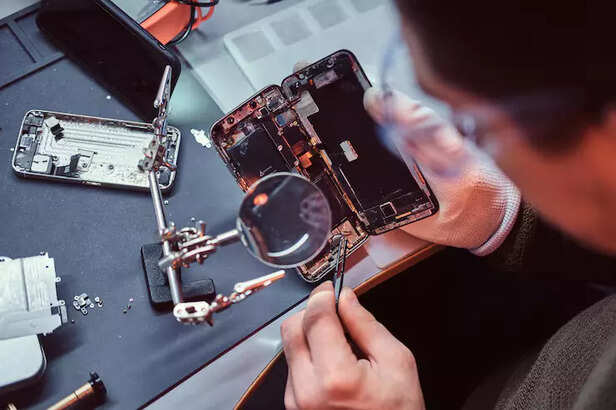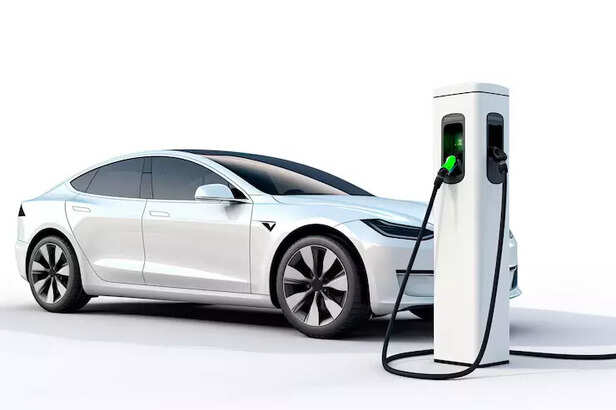India's Manufacturing Revolution, Apple, Foxconn, and Tesla Lead the Charge
Amritansh Nayak | Apr 24, 2025, 12:03 IST

India's Production-Linked Incentive (PLI) programs, which draw industry titans like Apple, Foxconn, and Tesla, are driving the country's efforts to become a global manufacturing hub. These programs boost local production in electronics, automobiles, and EVs, creating jobs and reshaping India’s economy. As the nation aims to be a leader in technology and sustainable mobility, infrastructure issues still exist.
With big companies like Apple, Foxconn, and Tesla in the forefront, India is quickly becoming a global manufacturing powerhouse. India's manufacturing-Linked Incentive (PLI) programs, which provide financial incentives to increase local manufacturing across important sectors including electronics, autos, and electric vehicles (EVs), are at the centre of this change. There are still infrastructure issues even if the nation offers a wealth of growth prospects. India is positioned to change the global manufacturing scene as Apple moves its production from China and Tesla considers entering the Indian EV market, but there are still barriers in the way.

India's efforts to become a global manufacturing hub have been revolutionized by its Production-Linked Incentive (PLI) programs. These programs, which were first introduced in 2020 and target important industries including electronics, semiconductors, automobiles, pharmaceuticals, and renewable energy, provide financial incentives to businesses based on increased sales of items made in India. The PLI scheme has drawn major players in the electronics industry, including Foxconn, Samsung, and Apple. The production of iPhones is being increased in India by Foxconn, Wistron, and Pegatron, Apple's manufacturing partners supported by rewards that can reach 6% of five-year growth in sales.
Samsung has invested more than $650 million to establish one of the biggest mobile manufacturing facilities in the world in Noida. Under the PLI initiative, the government has distributed more than ₹2 lakh crore (almost $24 billion) to 14 industries. The outcome? a predicted $500 billion increase in manufacturing production by 2025, along with an estimated 60 lakh (6 million) direct and indirect jobs. The PLI project is drawing in international firms and hastening India's transition from an import-dependent economy to an export-driven manufacturing powerhouse by directly tying rewards to local value addition and output.

Establishing India as a Major Player in
From careful assembly to a daring manufacturing drive, Apple's journey in India has changed, indicating a strategic shift away from its significant reliance on China. Wistron's restricted assembly of iPhone SEs in 2017 gave way to full-scale production of flagship models like the iPhone 14 and 15, which are currently being made in India nearly simultaneously with their worldwide release. This development has been spearheaded by Foxconn, Apple's biggest manufacturing partner. It is spending more than $1.5 billion on new facilities in Karnataka and Tamil Nadu, including a huge plant that is anticipated to generate 50,000 employment close to Bengaluru.
Foxconn is increasing hiring and local sourcing in addition to acquiring property and developing infrastructure to satisfy Apple's requirements for scalability and excellence. In Apple's Indian operations, Pegatron and Wistron have also emerged as significant players. While Wistron's India operations were recently acquired by the Tata Group, potentially providing Apple with its first Indian-owned manufacturing partner, Pegatron recently expanded its investment to expand iPhone assembly. India is rapidly emerging as Apple's next major production location as a result of China's growing supply chain issues and geopolitical dangers. This change not only enhances India's technological presence internationally but also marks the country's rise to prominence in the production of luxury gadgets.

Elon Musk has confirmed new discussions with Indian officials and indicated a strong desire to create a manufacturing facility, bringing Tesla's long-awaited entry into India one step closer to reality. Musk met with senior government officials and Prime Minister Narendra Modi in 2024 to discuss plans to establish an electric vehicle facility and a possible battery storage store. According to reports, states like Tamil Nadu, Gujarat, and Maharashtra are being considered for the locations of factories. Due to its expanding middle class and rising demand for clean mobility, India presents Tesla with enormous market opportunity. The nation is a desirable travel destination because of the government's aggressive goals, which include having 30% of all automobiles sold be electric by 2030. Additionally, India just unveiled a new EV policy that lowers import taxes for automakers who pledge to produce locally within three years. But there are still difficulties. With few fast-charging stations and supply chain issues for batteries and other parts, India's EV infrastructure is still in its infancy. Progress may also be slowed by high land costs, lengthy bureaucratic processes, and complicated regulations. However, Tesla has the potential to revolutionize India's EV ecosystem and establish the nation as a major participant in the world of sustainable mobility manufacturing if it can overcome these obstacles.
There has been a lot of conjecture over Tesla's potential entry into India, but 2024 marked a major advancement. Prime Minister Narendra Modi and other Indian government representatives met with Elon Musk to talk over plans for establishing a manufacturing plant. Tesla is looking at possible sites in Tamil Nadu, Gujarat, and Maharashtra in an effort to capitalize on the expanding electric vehicle (EV) market in India. For Tesla, India offers enormous potential. Rising fuel prices and a younger, more ecologically conscious populace are driving the nation's EV market's rapid expansion. With the use of incentives like tax breaks and subsidies for both manufacturers and consumers, the Indian government has set lofty goals to have 30% of all vehicles on the road be electric by 2030.
By choosing to build locally, Tesla would be able to accomplish these goals and take advantage of a market that is expected to expand at a compound annual growth rate of more than 40%. Infrastructure is still a significant obstacle, though. There aren't many charging stations, and battery supply networks are still evolving. The endeavor becomes more problematic because to high land expenses, regulatory hold-ups, and import duty worries. Notwithstanding these obstacles, Tesla's dedication to India may hasten the nation's shift to a more environmentally friendly future.
In conclusion, India is becoming a global manufacturing hub thanks to its manufacturing revolution, which is being driven by programs like the Production-Linked Incentive (PLI) schemes. With major investments from industry titans like Apple, Foxconn, and Tesla, India is poised to transform its economy and become a major force in industries like electronics, autos, and electric vehicles. Even if issues like regulatory barriers and infrastructure deficiencies still exist, India is well-positioned to overcome them thanks to its robust government support and expanding market potential. India is poised to become a key link in the global supply chain, propelling technological innovation and economic growth as multinational corporations move their production there.
Explore the latest trends and tips in Health & Fitness, Travel, Life Hacks, Fashion & Beauty, and Relationships at Times Life!

Production-Linked Incentive
The Production-Linked Incentive (PLI) Programs in India
Samsung has invested more than $650 million to establish one of the biggest mobile manufacturing facilities in the world in Noida. Under the PLI initiative, the government has distributed more than ₹2 lakh crore (almost $24 billion) to 14 industries. The outcome? a predicted $500 billion increase in manufacturing production by 2025, along with an estimated 60 lakh (6 million) direct and indirect jobs. The PLI project is drawing in international firms and hastening India's transition from an import-dependent economy to an export-driven manufacturing powerhouse by directly tying rewards to local value addition and output.

iPhone Manufacturing
Establishing India as a Major Player in iPhone Manufacturing
Foxconn is increasing hiring and local sourcing in addition to acquiring property and developing infrastructure to satisfy Apple's requirements for scalability and excellence. In Apple's Indian operations, Pegatron and Wistron have also emerged as significant players. While Wistron's India operations were recently acquired by the Tata Group, potentially providing Apple with its first Indian-owned manufacturing partner, Pegatron recently expanded its investment to expand iPhone assembly. India is rapidly emerging as Apple's next major production location as a result of China's growing supply chain issues and geopolitical dangers. This change not only enhances India's technological presence internationally but also marks the country's rise to prominence in the production of luxury gadgets.

Tesla's Entry into India
Tesla's Entry into India : Prospects, Challenges, and the EV Ecosystem
Tesla's Entry into India: Prospects, Challenges, and the EV Ecosystem
By choosing to build locally, Tesla would be able to accomplish these goals and take advantage of a market that is expected to expand at a compound annual growth rate of more than 40%. Infrastructure is still a significant obstacle, though. There aren't many charging stations, and battery supply networks are still evolving. The endeavor becomes more problematic because to high land expenses, regulatory hold-ups, and import duty worries. Notwithstanding these obstacles, Tesla's dedication to India may hasten the nation's shift to a more environmentally friendly future.
In conclusion, India is becoming a global manufacturing hub thanks to its manufacturing revolution, which is being driven by programs like the Production-Linked Incentive (PLI) schemes. With major investments from industry titans like Apple, Foxconn, and Tesla, India is poised to transform its economy and become a major force in industries like electronics, autos, and electric vehicles. Even if issues like regulatory barriers and infrastructure deficiencies still exist, India is well-positioned to overcome them thanks to its robust government support and expanding market potential. India is poised to become a key link in the global supply chain, propelling technological innovation and economic growth as multinational corporations move their production there.
Explore the latest trends and tips in Health & Fitness, Travel, Life Hacks, Fashion & Beauty, and Relationships at Times Life!
